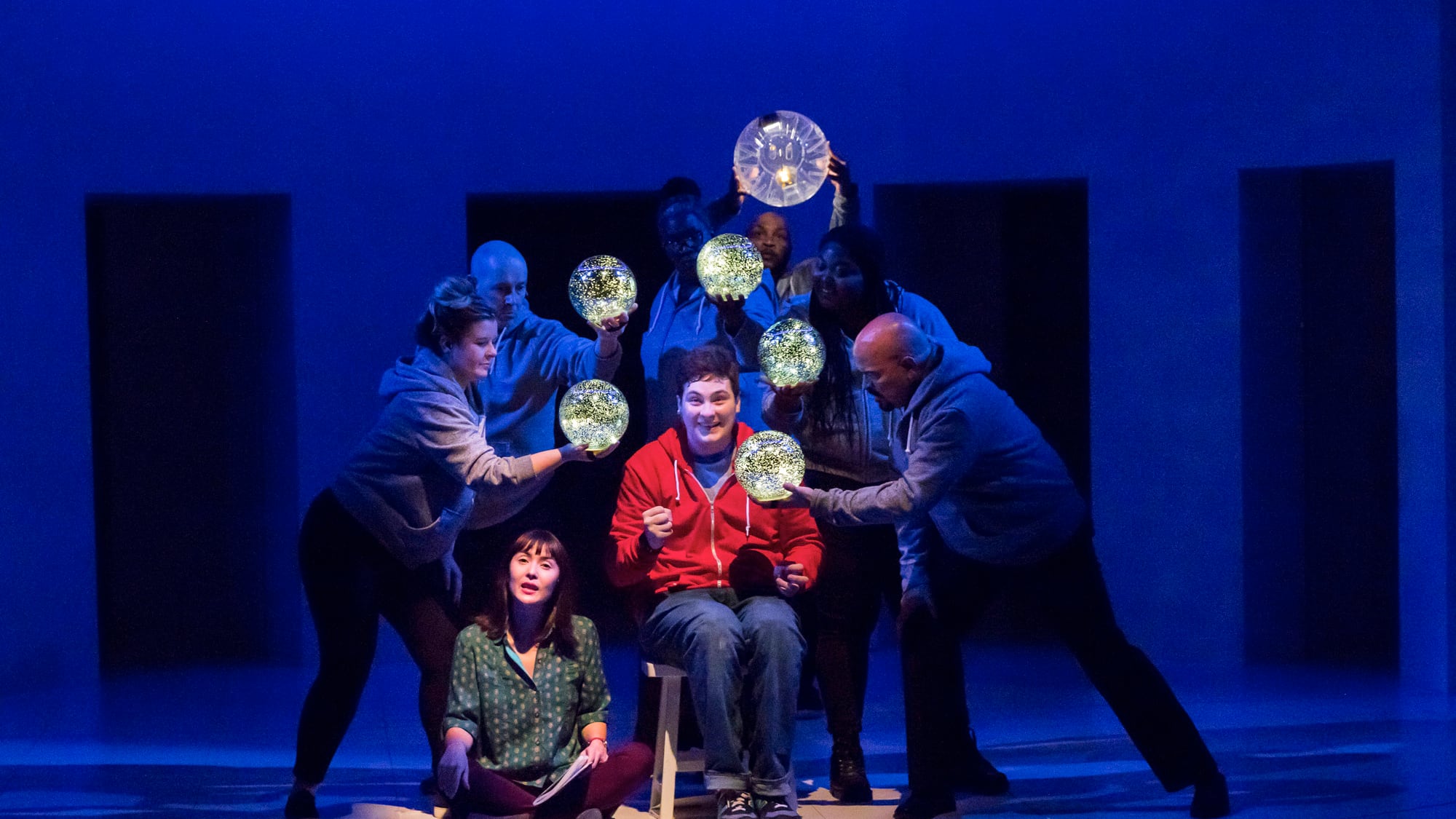The crime is murder. The victim is a dog. The detective on the case is a British teen.
That’s the premise of Simon Stephens’ play The Curious Incident of the Dog in the Night-Time, based on the 2003 novel by Mark Haddon. It’s a buzzy setup, but the play is not really about murder, dogs or amateur detective work. It’s about identity, communication and, most of all, movement.
Those themes flourish in Portland Center Stage’s production of Curious Incident, which mostly rises above the play’s flaws. There’s no eclipsing the artificiality that bedevils some of the storytelling, but director Marissa Wolf and the cast succeed in bringing poetry and surrealism to a story that isn’t always as clever as it wants to be.
Curious Incident, which opened at the Armory in March 2020 a week before the first pandemic lockdown, begins with 15-year-old Christopher (Jamie Sanders) discovering that Wellington, a neighbor’s dog, has been stabbed to death with a garden fork. A policeman accuses Christopher, but he’s not just innocent—he’s exhilarated by the thought of solving Wellington’s murder.
In the novel, Christopher is described as “a mathematician with some behavioral difficulties.” Those “difficulties” might be a result of Asperger syndrome or high-functioning autism—Haddon was never specific—but the play clearly shows that investigating the mystery of Wellington’s demise brings Christopher a sense of purpose he has long lacked.
Curious Incident uses actors not only to create characters, but to create scenery. During a flashback in which we see Christopher’s mother (Ayanna Berkshire) at the seaside, she is surrounded by a Greek chorus of performers who swirl around her, imitating the motions of surging waves.
It’s thrilling and fitting that the actors mold and unmold themselves, embodying roles ranging from cops to London subway doors. Christopher is so overwhelmed by the world around him that he can’t bear to be touched, so the idea of his surroundings coming to life and literally engulfing him has an eerie inevitability. The world of the play is the world as he sees it.
That world also contains questionable writing—Stephens is faithful to Haddon’s novel, histrionic plot twists included. It’s not enough for Christopher’s father (Leif Norby), for instance, to have one shocking secret—he has to have two. Just as the noise of life threatens to overwhelm Christopher, the noise of the plot threatens to overwhelm the characters.
It doesn’t help that the story’s sense of humor is overcooked. Too often, Curious Incident begs for the audience’s attention with jokes that are more irritating than endearing—especially during a scene where a suspicious Christopher searches his father’s bedroom and finds a series of trinkets that seem mechanically engineered to be punchlines, like a Scooby-Doo tie and some pee-stained underwear from T.J. Maxx.
Cheap laughs are a common currency in contemporary plays. Stephens is far from the only playwright who seems to believe that audiences can’t handle complex ideas unless they’re accompanied by cheap jokes, but that assumption says more about his abilities as a writer than the tastes of ticket buyers.
Thankfully, Portland Center Stage has more faith in audiences. Sanders’ triumphantly intense performance trusts us to withstand the hurricane of obsession, loneliness and pride coursing through Christopher’s soul—feelings that are deepened and defined by Arnulfo Maldonado’s elegant and evocative scenic design.
The set is painted whitish gray and topped with a round, disclike structure that looks like a flying saucer. It’s a reference to Christopher’s fascination with outer space, but Maldonado’s smooth surfaces also suggest a suffocatingly sterile laboratory, hinting that Christopher feels he is as much a captive as his pet rat, Toby.
Countless forces confine Christopher emotionally, including the manipulations of his father, the absence of his mother, and the mystery of Wellington, which becomes a manifestation of the frequent incompatibility between the world and his needs. He wants to be free of his bonds, but more importantly, he needs to understand them.
While that journey could have particular resonance for audience members with conditions like Christopher’s, his struggle to make peace with the people and places around him is as universal as it is specific. “It’s bloody hard telling the truth all the time,” Christopher’s father tells him. That may be true, but at its best, The Curious Incident of the Dog in the Night-Time speaks the truth clearly and beautifully.
SEE IT: The Curious Incident of the Dog in the Night-Time plays at Portland Center Stage at the Armory, 128 NW 11th Ave., 503-445-3700, pcs.org. 7:30 pm Thursday-Friday, 2 and 7:30 pm Saturday-Sunday, through Dec. 24. Sensory-friendly show 7:30 pm Tuesday, Dec. 21. No 7:30 pm shows Sunday, Dec. 19 and Friday, Dec. 24.

